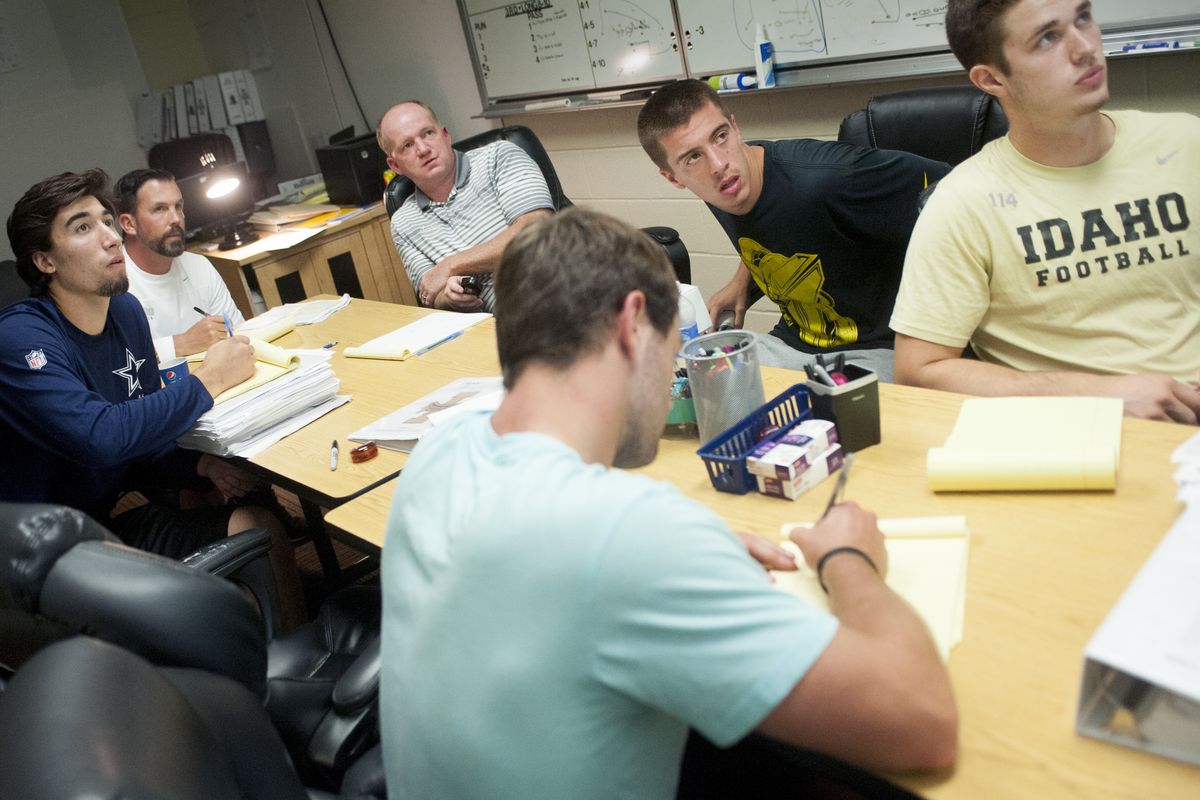Like father, like son
Tireless work ethic remains the Petrino way

MOSCOW, Idaho – Their job was to stay at the bus station and wait.
Paul and Bobby Petrino, with a $1.25 from their dad in their pockets, would park themselves at the pinball machines and keep an eye out for the right bus. They didn’t mind the work.
This was in Helena, Montana, in the 1970s, when pinball cost 10 cents and college football coaches like Bob Petrino Sr. at Carroll College had to wait for 16-millimeter game film of their opponents to arrive before they could make cut-ups.
Petrino Sr. wanted to get his hands on the tape as soon as he could. So he enlisted his sons – future quarterbacks for him at Carroll – and ordered them to call right when the film arrived.
Paul Petrino, now 47 and the coach at Idaho, smiled as he recalled those bus station visits with his older brother and how different the coaching profession looks today than it did when he helped his father as a boy.
Technology advances have opened up opportunities for more film study. Time away in the offseason is shorter because of new NCAA rules. Recruiting is a 12-month endeavor.
All things considered, the job is more consuming.
“Used to be in the old days you went home for four weeks or went wherever and came back,” Petrino said. “But now you’re here the whole year, year-around. It’s a great thing – college football’s the most popular sport there is, so it’s awesome.”
Petrino Sr. drove a taxi in the summer to help provide for his family, in addition to serving as Carroll College’s athletic director and only full-time football coach for part of his successful 28-year tenure. Now Paul and Bobby, the coach at Louisville, spend their summers recruiting and monitoring players’ offseason conditioning.
The really long hours, though, start in August. With the Vandals preparing for their Aug. 30 season opener at Florida, Petrino and his staff are often in their offices until midnight after arriving at 7 or 7:30 a.m.
Late in the evening, the offensive and defensive staffs split up to parse every detail from that day’s practice or practices and prep for the next day’s meetings with players.
Practice and game “tape” is now all digital, and it’s available in quantities that coaches from another era could scarcely imagine.
“They didn’t video practice back in the day and we video practice and stay till midnight getting it graded and making corrections and stuff,” Idaho offensive coordinator and offensive line coach Kris Cinkovich said. “So that part has made it more time-intensive.
“I’d like to think it’s made it for the better. I think football’s popular for a reason.”
Petrino, a self-described football junkie, analyzes as much practice or game film as he can partly because he knows opposing coaches are obsessing over it too. He and Bobby used to spend parts of their offseason examining two or three NFL offenses at a time.
Their eye for detail and precision on the football field came early, when they started charting tackles, breaking down tape and announcing defensive coverages – anything they could do – for their dad.
“Bobby and (Paul) helped me a lot,” Petrino Sr. said from his home in Helena. “They wanted to be coaches from Day One, although their dad tried to talk them out of it.”
Paul’s devotion to his craft hasn’t gone unnoticed. Cinkovich said the bar has been set that “nobody’s going to work harder than the head coach, and that’s always a good thing because that means everybody has to rise to it.”
That goes for the players, too.
“I believe so because we know that the coaching staff is here until probably 1 or 2 o’clock in the morning watching film and trying to get it ready for us,” senior defensive end Quinton Bradley said. “We try to do as much extra we can in the time frames of our schedule. In fall camp, everything’s tight. So if we can get some extra film or an extra little workout or an extra ice bath, it’s all for good.”
Players and coaches are together 10 months out of the year, or potentially longer for teams that reach a bowl game. The only breaks for players come after the season and after the school year when spring camp wraps up.
The winter weightlifting and summer workouts can be draining. But only to a point.
“It’s a strain, but if you love football, you’ll get through it,” Bradley said. “Because we all want to excel in this. We all want to do good, do great. So the more we can learn, the more we can put in our brain about football, the better. But I’m not gonna lie – it is a lot of football.”
Regardless of the time he spends in his second-floor office in the Kibbie Dome, Petrino will never consider himself a harder worker than his father. As a small-school coach at Carroll College, Petrino Sr. met regularly with the offense and the defense. He coached pretty much every position. For seven or eight years, he was also AD and building coordinator.
Just as Idaho players and coaches take notice of Petrino’s work ethic, he took notice of the time his father put into coaching and making ends meet.
“That’s how you know,” he said. “That’s hopefully how you’re raised, so you know that’s how you get somewhere by working hard.”
No matter how the job changes.